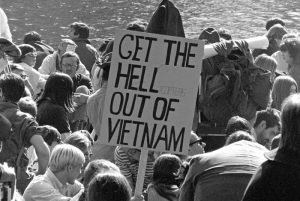
Views: 295
In his militarist lust he was near lunacy; his ignorance: profound; he was, in many respects, conventional—numbingly conventional—on Washington’s global role. That was John McCain.
 This was a man who, post-9/11, promoted measures expected to boost foreign terrorism. “Within hours” of that morning’s carnage, he made himself “leading advocate of taking the American retaliation against Al Qaeda far beyond Afghanistan,” to countries—like Iraq—with no Qaeda ties, where revenge, really, would be aggression. On CNN, aboard the USS Theodore Roosevelt, on “Face the Nation” he pushed for assaulting Iraq, stressing the “need to keep telling the American people” about Saddam’s menace, to keep “frightening and scaring them every day.”
This was a man who, post-9/11, promoted measures expected to boost foreign terrorism. “Within hours” of that morning’s carnage, he made himself “leading advocate of taking the American retaliation against Al Qaeda far beyond Afghanistan,” to countries—like Iraq—with no Qaeda ties, where revenge, really, would be aggression. On CNN, aboard the USS Theodore Roosevelt, on “Face the Nation” he pushed for assaulting Iraq, stressing the “need to keep telling the American people” about Saddam’s menace, to keep “frightening and scaring them every day.”
Later, as hopes shattered for quick success in Iraq on Washington’s terms—the only terms concerning McCain—he started “calling for the deployment of at least another division,” growing “more strident in his advocacy of escalation” with time. More young soldiers had to go to Baghdad, many to die. These troops became “the surge,” to McCain a triumph, proof of his acute thinking, his wartime sagacity. “The surge has succeeded,” he declared in 2008, claiming it showed how Washington could win in Afghanistan.
Relevant scholarship reveals these claims were, if we’re polite, dubious, if not: bullshit. Stephen Biddle, Jeffrey A. Friedman and Jacob N. Shapiro, in International Security, determined the surge “was insufficient to explain 2007’s sudden reversal in fortunes,” since “local conditions that will not necessarily recur elsewhere” were “essential” to its success. “These findings suggest caution for Afghanistan, in particular,” they warned. Others drew darker conclusions. Steven Simon, in Foreign Affairs, wrote that the strategy enflamed “the three forces that have traditionally threatened the stability of Middle Eastern states: tribalism, warlordism, and sectarianism.”
But these matters lay beyond McCain’s field of attention. So did other developments: the million slaughtered; the millions more displaced; the linked plagues of cancer, soaring infant mortality and congenital birth defects in bomb-crippled Fallujah and Basra. One scholar judged the U.S. occupation “the biggest cultural disaster since the descendants of Genghis Khan destroyed Baghdad in 1258.” McCain helped visit this nightmare on Iraq.
His decisions haunt Yemen as well. “Thank God for the Saudis,” he proclaimed, insisting it was “not true” their bombings took out Yemeni civilians, that U.S. legislators were “crazy” trying to bar Trump’s $110 billion arms sale to Saudi Arabia. In reality, the Saudis in Yemen have “killed thousands of civilians in airstrikes, tortured detainees, raped civilians and used child soldiers as young as 8—actions that may amount to war crimes,” the UN concluded.
Again: “tortured detainees.” Contrary to eulogies saturating the news, McCain struck no principled stance against torture, and in fact supported, many times, groups infamous for their appalling treatment of hostages. He personally paid the Contras, for example, who counted as members “major and systematic violators of the most basic standards of the laws of armed conflict.” A congressional inquiry learned they “raped, tortured and killed unarmed civilians, including children,” that they “burned, dismembered, blinded or beheaded” their victims.
He later endorsed the Mojahedin-e Khalq (MEK), the Iranian opposition group. “I thank you for being an example, an example to the whole world,” McCain told its leader. Human Rights Watch (HRW), reporting on MEK, discussed “abuses ranging from detention and persecution of ordinary members wishing to leave the organization, to lengthy solitary confinements, severe beatings, and torture of dissident members.”
Then McCain rejected “the push to investigate and possibly prosecute Bush administration officials who crafted the legal basis for the use of ‘enhanced interrogation techniques,’ such as waterboarding,” citing the “need to move forward.” The ACLU, Amnesty International, and HRW were just some of the critics condemning this stance.
That latter outfit also censured John Negroponte, McCain’s choice for U.S. Ambassador to the UN. Negroponte’s Honduran tenure (1981-85) coincided with state-backed “abduction, torture, and murder of scores of people,” as “millions of dollars of U.S. military aid” flowed into the country.
Reagan-era policies, like those Negroponte administered, helped spur Central American migration to the U.S. Many seeking refuge here confronted, more and more over the years, a border that “promotes the death of migrants,” a boundary that channels them onto lethal desert paths. This weaponized line was one of McCain’s great causes: he called again and again for more Border Patrol agents and National Guard troops to police southern Arizona; for enhanced surveillance and Unmanned Aerial Vehicles to monitor the zone; for “double-layer fencing at needed locations.”
 McCain’s border priorities also lay bare his alleged environmentalism. He co-sponsored the Arizona Borderlands Protection and Preservation Act, which imperiled “a vast, 10-million-acre area of Arizona without any remotely corresponding border-security benefits.” A related proposal was “the most direct assault on national parks ever to be advanced at any level in any Congress in U.S. history,” the Coalition of National Park Service Retirees believed.
McCain’s border priorities also lay bare his alleged environmentalism. He co-sponsored the Arizona Borderlands Protection and Preservation Act, which imperiled “a vast, 10-million-acre area of Arizona without any remotely corresponding border-security benefits.” A related proposal was “the most direct assault on national parks ever to be advanced at any level in any Congress in U.S. history,” the Coalition of National Park Service Retirees believed.
There were other signs of his reverence for nature: McCain dismissed as “extremely disappointing” Obama’s Keystone XL pipeline rejection. He praised Trump for working to dismantle the EPA’s “Waters of the United States” rule, a move savaged as a “reckless attack on our waters and health.” And he lauded Scott Pruitt’s Clean Power Plan rollback, deemed “a boon to the coal industry.”
This ersatz maverick—who voted with George W. Bush 95% of the time, with Trump 83% of the time—left a clear legacy. Unmoored from reality, unmoved by the pain his policies caused: that was John McCain.
Originally published on 2018-09-07
Source: Counter Punch
Origins of images: Facebook, Twitter, Wikimedia, Wikipedia, Flickr, Google, Imageinjection & Pinterest.
Read our Disclaimer/Legal Statement!
Donate to Support Us
We would like to ask you to consider a small donation to help our team keep working. We accept no advertising and rely only on you, our readers, to keep us digging the truth on history, global politics and international relations.
FOLLOW US ON OUR SOCIAL PLATFORMS









